

Wp14. Viewcontent. Identifying-the-Obstacles-to-High-Impact.pdf. A structural model of firm and industry evolution: Evidence from Chile. Murat Şeker, Innovation, Technology and Entrepreneurship Practice, World Bank, 1818 H Street, NW Washington, DC 20433, MSN: F4P-402, United States Received 19 August 2010, Revised 3 October 2011, Accepted 3 January 2012, Available online 24 January 2012 Choose an option to locate/access this article: Check if you have access through your login credentials or your institution Check access doi:10.1016/j.jedc.2012.01.007 Get rights and content Abstract Although there are many models that yield a simple interpretation of the basic features of firm and industry evolution, they are too stylized to confront the micro-level data in a formal quantitative analysis.
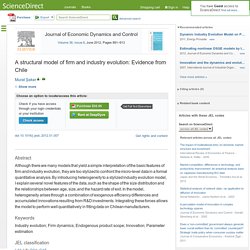
Keywords Industry evolution; Firm dynamics; Endogenous product scope; Innovation; Parameter estimation JEL classification Copyright © 2012 Elsevier B.V. Echecopar,%20German%20-%20Public%20policy%20for%20entrepreneurial%20finance.pdf. 53ea0c970cf2dc24b3cb02d3. Viewcontent. An Error Occurred Setting Your User Cookie.
When Family Members Are Also Business Owners: Is Entrepreneurship Good for Families? - Jennings - 2013 - Family Relations. "Attracting FDI: The Chilean Government's Role Promoting Renewable Ener" by Kyle Herman. Kyle Herman Article comments This paper will be presented in Montevideo, Uruguay April 8th, 2013 at the 4th Latin-American Energy Economics Conference.
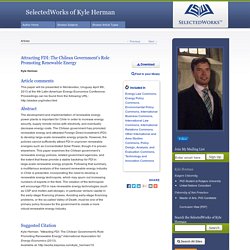
Proceedings can be found from the following URL: Abstract The development and implementation of renewable energy power plants is important for Chile in order to increase energy security, supply remote mines with electricity, and eventually decrease energy costs. Suggested Citation Kyle Herman. Entrepreneurship Policy and Its Impact on the Cultural Legitimacy for Entrepreneurship in a Developing Country Context. Ayudarum: an Austrian crowdsourcing company in the Startup Chile accelerator program. The founders of Ayudarum, an Austrian crowdsourcing company that is focused on connecting students with potential employers, joined the Chilean Startup accelerator ‘Startup Chile’ to help their young company expand outside its European roots.
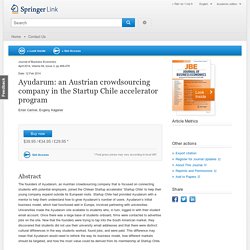
Startup Chile had provided Ayudarum with a mentor to help them understand how to grow Ayudarum’s number of users. Ayudarum’s initial business model, which had functioned well in Europe, involved partnering with universities. Universities made the Ayudarum site available to students who, in turn, logged in with their student email account. Once there was a large base of students onboard, firms were contacted to advertise jobs on the site. Now that the founders were trying to tap into the South American market, they discovered that students did not use their university email addresses and that there were distinct cultural differences in the way students worked, found jobs, and were paid. Building International Social Capital at the Startup Chile Accelerator by Erran Carmel, Jessica Richman. Erran Carmel American University - Kogod School of Business Jessica Richman Oxford UniversitySeptember 21, 2013 Abstract: Startup Chile (SUP), a business accelerator launched with much international fanfare by the Chilean government in 2010, is seen as a key reason that Santiago is now ranked among the world’s top startup cities.
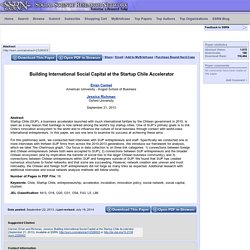
For this preliminary work, we conducted field interviews with SUP entrepreneurs and staff. Number of Pages in PDF File: 19. 597776415.pdf. Building International Social Capital at the Startup Chile Accelerator by Erran Carmel, Jessica Richman. START-UPS ARGENTINA. The biggest startup community in the world.
World Development Report 2015: Mind, Society, and Behavior. World Development Indicators. WDR 2016 Internet for Development. Small Enterprises in the Middle East and North Africa Face Risks and Rewards in the Public Market. World Bank Governance Practice Manager Yolanda Tayler explained, “Even though SMEs represent between 80 to 90% of formal sector enterprises in MENA, they are often not aware of the potential that the public market offers to them.
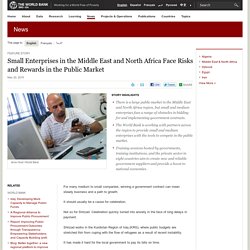
In Iraq, for instance, over US$51 billion is spent through public procurement. Yet, the smaller enterprises are not benefiting from their fair share of that spending.” To address these issues, the World Bank is working with governments, training institutions, and the private sector in eight countries to reach out to SMEs and expose them to tools and methods that will help them to compete in the public market. In sum, over 70 trainings will have taken place by the end of June, 2015, under a landmark regional program funded by the MSME Facility of the Arab World Initiative.
In KRG, the Kurdistan Contractors Union has collaborated with the Ministry of Planning to execute 10 workshops across four cities, targeting 250 SMEs.